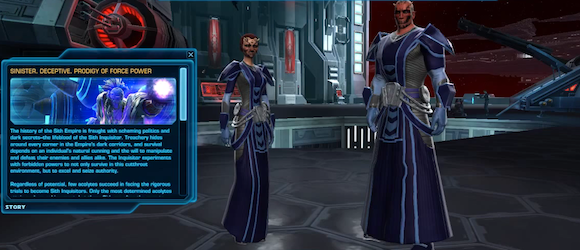I spend a staggering amount of time thinking about video games. I’m constantly chewing on the reasons for the character choices we make and how people are represented within games. I’ve spent a lot brainpower mulling over that stuff from a woman’s perspective, and I confess that for a long while, I hadn’t dedicated many neurons to wondering how our brothers-in-arms felt about those very same things.
I knew that there was a big difference between the groovy gamer guys I hang with and the snarling trolls that lurk elsewhere. I knew that some men do not speak for all men, and that male gamers are every bit as diverse as women gamers. But there was one point that I had made a rather mindless assumption on: that for most straight male gamers, the main reason for playing a female character was to have something nice to look at. I mean, if you’ve spent any time in a multiplayer game, you’ve heard the following phrase: “If I’m going to look at an ass all day, I don’t want it to be a dude’s.” Even the most egalitarian gentleman can enjoy a bit of eye candy (who doesn’t?), and surely the plethora of cheesecakey box art and booth babes meant that the industry knew it was a view that most dudes shared.
But a few occurrences over the past few months got me thinking there was a lot more depth to the “target audience” than was being talked about.
One friend told me that in most RPGs, he prefers to play as a woman. Bear in mind, this is a guy who is biologically male, identifies as male, and presents himself in what I would consider to be a traditionally masculine manner. He found that if the gender of the character didn’t affect the story too much, then female characters were usually easier for him to relate to than their hyper-macho, gravelly-voiced counterparts. The typical portrayal of men in games was so far removed from his own identity that he often found it easier to play a woman.
Months later, my brother got into the beta for The Old Republic. As he was waxing poetic about the game over Skype, he mentioned that the Sith Inquisitor he created was female. I asked why. He swung the webcam around so that I could see the character creation screen. Two graceful Sith Inquisitors bowed towards me — the female lithe and sleek, the male broad and beefy. The character my brother wanted to create was a stealthy assassin, the kind of person you send in to quietly solve problems. In his eyes, the smaller female character was the obvious fit. I had to admit, it was hard to picture Darth Barrel Chest sneaking through windows.
Then a stranger commented on my personal blog. He, too, said that he generally went for female characters over male characters, and that he was irritated by things like his Dead Island character running around in high heels. He wondered why she never changed into “comfortable footwear.”
My curiosity was piqued. More and more, I found myself talking with or reading articles by male gamers (like Charlie Brooker’s great critique of Modern Warfare 3) who felt a disconnect between the fantasy on screen and their own sense of masculinity. That’s a feeling women gamers know keenly well (in terms of femininity, of course). To hear that feeling voiced from the other side, and to hear that it was so strong for some men that they had switched over to playing women…that made my ears prick. But with all the “well, it sells games” rationale we hear from the industry itself, I wondered if what I was seeing was just a fluke. The industry must’ve done some market research or something, right?
If they did, I couldn’t find it. So I did some of my own.
I created an informal online survey about gender choice in games, which I set loose on the internet back in late November. In order to get a look at the big picture, I invited folks of all genders and gaming habits to take part. I didn’t want to limit the responses or bias the answers by asking only for guys who played women on occasion. Though a few respondents were personal friends, the grand majority of respondents were total strangers from all sorts of gaming backgrounds.
Wow, was it interesting.
Ninety-seven people took the survey — 54 men and 43 women. A small sample, yes, but even just scratching the surface provided some solid food for thought. The questions were pretty straight-forward: what the player’s gender was, what genres of games they liked to play, and what gender characters they preferred playing. This led to more detailed questions of why they preferred playing said characters. If you’re curious to see the questions for yourself, the survey results can be viewed here. (I should mention that SurveyMonkey didn’t give me a way to publicly separate responses by gender, so the percentages won’t be the same as the ones I list here. I also chose to filter out the optional written responses for privacy’s sake, as a few folks wrote some very personal things in confidence about sexuality, struggles with gender identity, and harassment; these were coupled with names and email addresses.)








